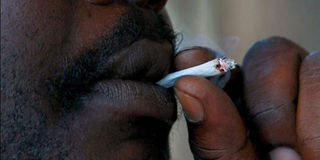What you need to know about oral cancer

Avoiding habits such as smoking and alcohol can help reduce your risk of developing oral cancers. file photo
Oral cancer is a type of cancer that occurs on the lips, inside the mouth, on the back of the throat, the tonsils or salivary glands. It occurs more frequently in men than women, and is likely to strike people who are over the age of 40. Smoking and heavy use of alcohol are key risk factors.
Studies show that if oral cancer is not detected early, it can be difficult to treat when the disease has progressed, requiring surgery, radiation therapy or chemotherapy. In some cases, it can also be fatal.
However, studies show that oral cancer is on the rise globally, yet it is also one of the most expensive cancers to treat. That is why early detection can help to manage the condition before it becomes costly to treat.
Symptoms
Even though early detection is crucial, the early signs and symptoms of oral cancer are hard to be spotted, and only a dentist or physician is able to do so.
Routine medical check-up can be helpful. Here are some danger signs to look out for.
•A sore on the lips, gums or in the mouth that bleeds and does not heal.
•A lump or thickening in the inside area of the cheek that you can feel with your tongue.
•Loss of feeling or numbness in any part of your mouth.
•White or red patches on the gums, tongue or inside the mouth.
•Difficulty in chewing or swallowing food.
•Soreness or unexplained pain in your mouth, or feeling that something is tucked in your throat with no known cause.
•Swelling of the jaw which makes it difficult for your denture to fit properly.
Prevention
Because smoking is a key factor in causing oral cancer, avoiding the vice can help to prevent the condition from occurring in the first place. It should also be noted that smoking also affects your general health, making it harder to fight infections and recover from injuries or surgery.
A person who smokes usually has difficulty with smell or taste and has a high risk of developing bad breath and stained teeth.
Smoking cigarettes increases your chances of developing cancers of the larynx, mouth, throat and esophagus.
The writer is a dentist
[email protected]




